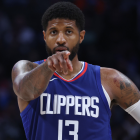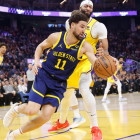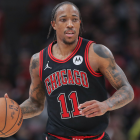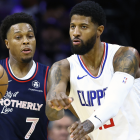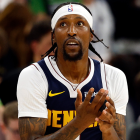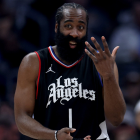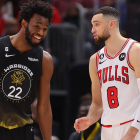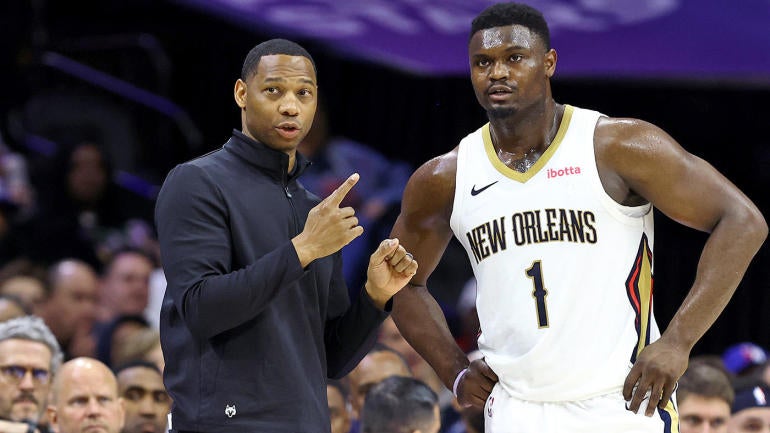
When the Los Angeles Lakers acquired Anthony Davis, they agreed to give the New Orleans Pelicans one of the most unusual first-round picks ever traded. The final pick in that deal was an unprotected 2024 first-rounder -- already pretty valuable back in 2019 because the Pelicans knew that LeBron James would be 39 when the 2024 NBA Draft rolled around. But David Griffin, having worked with James in Cleveland, wanted to squeeze a little bit of extra juice out of that pick knowing firsthand how foolhardy betting against LeBron can be. So the Pelicans extracted an extra stipulation out of the Lakers: if they were not satisfied with where that unprotected 2024 pick landed, they would have the right to defer that obligation to 2025.
On Saturday, the Pelicans officially filed the paperwork with the league needed to do just that, according to ESPN's Adrian Wojnarowski. The Lakers will keep the No. 17 overall pick in this draft. The Pelicans will control the Lakers' unprotected 2025 first-round pick. So, why did the Pelicans make this decision? In a word: upside.
The No. 17 overall pick in a normal draft is a relatively strong asset, and more importantly, most general managers tend to prefer the bird in the hand now, as job security at the top of front offices can be somewhat precarious. But, as has been widely reported, the 2024 draft class is almost universally considered the worst in recent memory. Now, you should take that with a grain of salt. The last time a class was this widely panned was in 2013 when Giannis Antetokounmpo went No. 15 and Rudy Gobert fell to No. 27. There will be talented players to come out of this crop of prospects. But there are no obvious franchise changers. Front offices don't even appear especially confident in their ability to identify good role players. In short, 2024 draft picks simply are not very valuable.
But 2025 draft picks? That's another story. That class has generally been considered quite strong, and it has a firm No. 1 star at the top in future Duke forward Cooper Flagg. Future Rutgers stars Dylan Harper and Ace Bailey both have star upside, and the class as a whole features easily half a dozen prospects that would be serious contenders to go No. 1 overall in 2024. Picks in 2025 are far more valuable than picks in 2024.
And the Lakers, frankly, might be far worse. They just got 147 combined games out of James and Davis last season. They got 111 out of them in 2023. If injuries again limit the Lakers, and there's a real chance they do with James turning 40 and Davis turning 32 during the season, the Lakers have plenty of room to fall. Think about how deep the Western Conference is. Only the Portland Trail Blazers are expected to openly rebuild next season. The Memphis Grizzlies will presumably be back in the mix. The Houston Rockets showed at the end of the season that they're ready for a leap. If San Antonio decides it's ready to try to win around Victor Wembanyama, the Spurs have the assets and cap space to make a significant jump as well. If the Lakers play at the same level next season but are just a little bit more injury-prone, they're going to fall out of the playoff mix.
From there, anything is possible. The Atlanta Hawks just jumped up nine spots in the 2024 lottery to earn the No. 1 pick. The Rockets, through a pick the Nets owed them in the James Harden trade, leaped up six slots to get to No. 3. The newly flattened lottery odds have leveled the playing field significantly. Once a pick is in the lottery, it automatically carries immense value.
Even if all of this wasn't true, there's a financial element that needs to be considered here. The Pelicans, in their current state, are one year away from luxury tax hell. That may change depending on how they approach this offseason, but this team is already deep and expensive. The last thing they need is to pay an unspectacular rookie they don't have minutes for. Delaying the pick until 2025 not only creates upside for a better prospect, but delays paying that prospect -- both his rookie deal and his more lucrative future extension -- by an extra year. That's going to be pretty important for the Pelicans if they have to start paying everyone else market value.
And so, the Lakers will pick at No. 17 in this year's draft. That's no great loss to the Pelicans. They will already have a pick in that range when they select at No. 21. But next season, they stand to walk away with a far greater prize.










